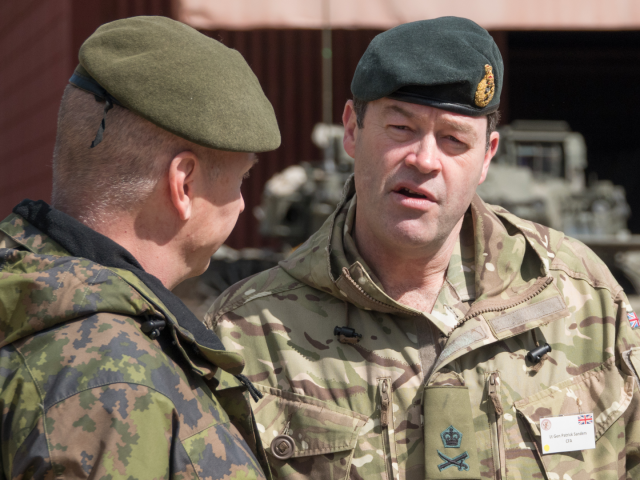The United Kingdom and its allies are facing a “1937 moment” in light of Russia’s most recent invasion of Ukraine, and therefore must “mobilise” its armed forces to “meet today’s threat and thereby prevent war in Europe,” the head of the British Army said on Tuesday.
Speaking before an annual army conference in London, General Sir Patrick Sanders, who became the head of the Chief of the General Staff earlier this month, warned that while the UK is not officially at war with Russia it must “act rapidly so that we aren’t drawn into one through a failure to contain territorial expansion.”
“It is dangerous to assume that Ukraine is a limited conflict; one of its obvious lessons is that Putin’s calculations do not always follow our logic,” General Sanders said.
The Army chief went on to warn that while Ukraine may have secured early victories, he noted that the Russian military “wages war at the strategic, not the tactical level – its depth and resilience means it can suffer any number of campaigns, battles and engagements lost, regenerate and still ultimately prevail.”
“We don’t yet know how the war in Ukraine will end, but in most scenarios, Russia will be an even greater threat to European security after Ukraine than it was before. The Russian invasion has reminded us of the time-honoured maxim that if you want to avert conflict, you better be prepared to fight,” Sanders declared.
He went on to note that with the growing threat of Communist China, the United States will become more engaged militarily in the Pacific theatre and therefore the United Kingdom and European members of NATO will necessarily bear more of the brunt in confronting the threat posed by Russia.
To adequately confront the threat, and hopefully prevent a war from actually breaking out between NATO and the Russian Federation, Sanders said that the UK, among other allies, must “mobilise” and strengthen their forces.
Laying out several key areas in need of reform, he said that the UK should look to “re-build” its weapons stockpiles as well as review the capability of its vehicle fleet to be deployed into a war theatre. Modernisation of command structures and weaponry was also a key point, saying that he plans to speed up the development of new long-range weapons, attack aviation, as well as surveillance technologies.
Perhaps unsurprisingly for a soldier looking to get more funding for the army, Sanders said future wars would likely be similar to the conflict in Ukraine, namely that land power will be key and therefore new NATO war plans should be “rooted in geography”.
“If this battle came, we would likely be outnumbered at the point of attack and fighting like hell. Standoff air, maritime or cyber fires are unlikely to dominate on their own – Land will still be the decisive domain. And though I bow to no one in my advocacy for the need for game-changing digital transformation, to put it bluntly, you can’t cyber your way across a river. No single platform, capability, or tactic will unlock the problem,” the army chief said.
Despite the British government allocating £41 billion to Army equipment over the next decade, prior to the war in Ukraine, the government had announced that it would be looking to decrease the number of active soldiers in its ranks in favour of drones and other cyberwarfare. Sanders said that this should be taken off the table due to the potential need for troops on the ground in a land war in Europe, describing the idea as “perverse”.
Other NATO nations have also been stepping up their spending on defence, notably Germany, which has consistently failed to meet the two per cent of GDP requirement of the treaty, a failure that was persistently noted by former President Donald Trump. Following the invasion of Ukraine in February, Chancellor Olaf announced that it would commit an additional €100 billion to defence spending annually.
The statements from the top commander of the British Army came amid the backdrop of the G7 summit in Bavaria, Germany. At the summit, Prime Minister Boris Johnson, the most hawkish ally of Ukraine — perhaps due to Britain being less reliant on Russian energy than its European counterparts — contended that the West should not engage in peace talks with Russia as the prospect of ceding Ukrainian territory in any agreement would only serve to embolden future territorial expansions through war.
Follow Kurt Zindulka on Twitter here @KurtZindulka

COMMENTS
Please let us know if you're having issues with commenting.